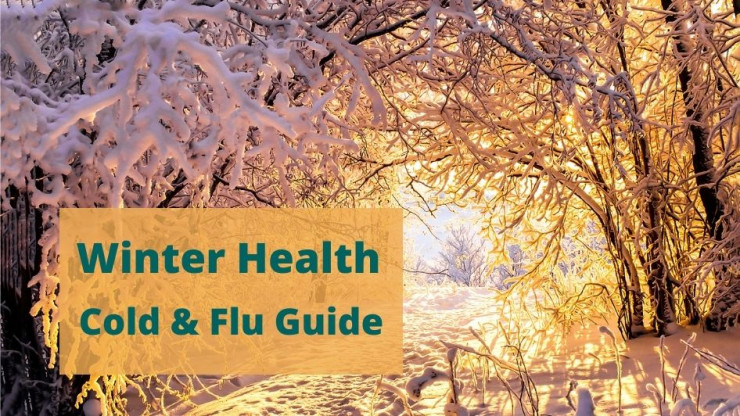As the weather grows colder, the days get shorter and we spend more time indoors, we’re much more likely to catch a cold or the flu.
Chesty coughs, runny noses, sneezing, congestion, watery eyes, aches and pains…These are just some of those tell-tale symptoms of these annoying seasonal viruses that can force you to spend time off school or work or stay curled up on the sofa all day.
Here at Whitworth, we want you to feel fighting fit all year round!
That’s why we’ve gathered together our tips on how to prevent colds and flu, ease your symptoms and recover faster.
We’ve also added useful information on the differences between head and chest colds, what to do if you have a pre-existing health condition and how you spot if it’s actually COVID. Let’s delve in.
Protect yourself and your family
As we always say here at Whitworth, prevention is better than cure! That’s why we recommend that you take steps to protect your family from colds and flu this season.
Most cold and flu viruses are passed on in the air via tiny droplets that are produced when people talk, cough or sneeze.
You can also catch them via personal contact or by touching a surface that has a virus on it, and then touching your eyes, mouth or nose. (Although this sounds unlikely, studies have shown that on average people touch these parts of their body around 23 times per hour!)
To reduce your chances of getting sick or minimising your symptoms, do the following:
1. Wash your hands often with soap. Ensure you’re covering all parts of your hands including your knuckles, palms and the backs of your hands. Then dry your hands with a clean towel.
2. Use hand sanitiser. If you can’t wash your hands or you’d like added protection from germs and viruses, use a hand sanitiser gel that contains at least 60% alcohol. Buy yours here.
3. Eat a healthy diet, exercise and get enough sleep. Keep your immune system in shape and keep colds and flu at bay.
4. Stay away from sick people. Don’t hug, kiss or shake hands with anyone who is sick to prevent you from catching a cold or flu. If you are sick, stay at home.
5. Disinfect your surfaces. Use antibacterial products to clean your door handles, children’s toys, light switches, mobile phones and any other commonly touched surfaces.
Get your flu vaccination
There isn’t a vaccine against the common cold but there is for the flu!
By simply popping into one of our branches, you can get a private or NHS flu vaccine and help ensure you stay fighting fit this winter. This is especially important for certain at-risk groups who are more likely to develop serious complications from catching the flu.
With the added threat of COVID-19, the UK government is aiming to vaccinate more people for free than ever before this winter. This includes:
Those in ‘at risk’ groups such as those with asthma
Personal assistants
All children aged 2 and 3 on 31 August 2021
All children in primary school and all children in school years 7 to 11 in secondary school
Those aged 6 months to under 50 years in clinical risk groups
Pregnant women
Those aged 50 years and over
Unpaid carers
Close contacts of immunocompromised individuals
Frontline health and adult social care staff
To find out more about the UK government’s flu vaccination strategy for winter 2021, click here.
Even if you’re not eligible for the free vaccine, you can still protect yourself and your family by getting the private flu vaccination.
Want to protect your employees from catching the flu?
We also offer flu vaccinations for companies who are local to our pharmacies. By getting vaccinated, you could reduce seasonal staff absences, help keep your team healthy and avoid further business disruption. Find out more here.
Learn the difference between cold and flu
Do you know the difference between a cold and the flu? Many people get confused when it comes to understanding which is which as the symptoms can be very similar. Whilst both are respiratory illnesses, there are only three kinds of flu and hundreds of viruses that can cause the common cold.
Common cold
Symptoms of a cold are usually milder than the flu. They include:
Runny nose
Sneezing
Stuffy nose
Loss of taste and smell
Sore throat
Coughing
Post-nasal drip
Pressure in your ears and face
Watery eyes
Mild fever (but not common)
You might feel rotten but you are usually able to function.
Flu (influenza)
Symptoms of the flu include:
Runny nose
Sneezing
Stuffy nose
Blocked nose
Sore throat
Coughing
Post-nasal drip
Watery or burning eyes
Body aches
Fever of 38°C or above
Chills
Diarrhoea
Vomiting
Loss of appetite
With the flu, you’ll usually feel utterly miserable and unable to function. You’ll just want to stay in bed and sleep all day. One tell-tale sign of the flu is that the symptoms usually come on suddenly and usually last between 5-7 days.
What about COVID?
Early symptoms of COVID can be very similar to a cold therefore it can be hard to tell the difference. If you experience a high temperature, a new continuous cough or loss of taste and smell, get a PCR test and self-isolate until you receive the results. It's always useful to have some lateral flow tests at home so you can take regular checks, ask in branch for a free box of lateral flow tests.
Learn effective self-care tricks to feel better
Whether you have a cold or the flu, you can treat your symptoms, reduce the duration of your illness and feel better with the following easy self-care tips.
Drink plenty
Drinking things like water, juice and warm drinks can help you stay hydrated, replace any fluids lost and soothe your sore throat. The steam from warm drinks like herbal tea or drinks like Lemsip can also help loosen any congestion and help your body fight back. Avoid sugary drinks, alcohol and caffeinated drinks like coffee and tea as they can be dehydrating.
Rest
You might feel tempted to power on through when you’re sick but this could make your illness last longer! Instead, get plenty of rest and sleep as much as you can so you can get back on your feet in no time!
Gargle
Ease your sore throat by gargling with a teaspoon of salt dissolved in warm water four times per day. Or if you have a tickle, why not mix a tablespoon of lemon juice with 500ml of hot water then add a teaspoon of honey? (Honey should never be given to children under 1).
https://www.nhs.uk/conditions/sore-throat/
Use a humidifier
Humidifiers can help ease nasal congestion and a sore throat and make breathing easier when you’re all stuffed up. See more on humidifiers.
Sleep with an extra pillow
If you’re struggling with a runny nose or congestion, add an extra pillow to help you feel more comfortable and help with drainage.
Find the right over the counter medicines
Cold and flu remedies can help you and your family reduce your symptoms and feel like yourself again. This includes analgesics to reduce pain and fever, decongestants to ease stuffiness, lozenges to soothe a sore throat and cough syrups.
Visit your local branch of Whitworth or head to our online store today. Here’s a pick of our favourites:
Sore throats: Strepsils Triple Action Extra Blackcurrant and Ultra Chloraseptic Throat Spray Cherry
Chesty cough: Benylin Mucus Cough Honey & Lemon
Dry, tickly cough: Benylin Dry & Tickle Cough
Headaches, fevers and general relief:
For kids: Calpol Infant and Calpol 6+
For adults: Lemsip Max All in One Capsules
Stuffy nose: Olbas Oil
Fight back with supplements
Certain vitamins, minerals and herbal medicines can help boost your immune system. This will help reduce your risk of developing a cold or flu and help minimise your symptoms if you do get unlucky.
Here’s what the team at Whitworth recommends…
High-quality multivitamin and mineral. There’s no need to worry about picky eaters or any gaps in your family’s nutrition when you take a one-a-day multi. Shop now.
Vitamin C: Give your immune system a boost and reduce the duration of your illness by taking a vitamin C supplement. Shop now.
Zinc: Like vitamin C, zinc can help reduce the duration of your illness. Shop now.
Learn the difference between a head cold and a chest cold
A head cold and chest cold are essentially the same things- they’re both respiratory infections. The difference lies in which part of your body they affect.
Head cold
If you have a head cold, you’ll mainly experience congestion in your head and throat. This could include a headache, runny nose, congestions, watery eyes, sneezing, a sore throat and a low-grade fever. It can be accompanied by body aches.
Chest cold
On the other hand, a chest cold (also called acute bronchitis) is associated with chest congestion, a cough and general soreness in your chest. It can also include a headache, body aches, and a sore throat.
Both usually get better on their own and there is no need for antibiotics. However, if you continue to experience symptoms of a chest cold, pop into your local branch of Whitworth or visit your GP for help. You may need further treatment.
Understand how to manage your illness if you have a pre-existing health condition
Most people can get through the misery of a cold or the flu within a few weeks. But if you have a pre-existing health condition such as asthma, diabetes, allergies or heart disease, you will need to take extra precautions.
Asthma
If you have a cold or flu, your asthma symptoms may become worse and you may find it harder to breathe. Certain medicines like antihistamines can thicken mucus and make it harder to cough.
Pop into your local branch of Whitworth for personalised advice.
Diabetes
You’re more likely to catch a cold or flu if you have diabetes because your immune system doesn’t work as it should. It will also be harder to control your blood sugar levels if you have diabetes so you’ll need to take extra steps if you become sick.
Certain medications for colds and flu can also affect your diabetes. Come and visit us to find the right medication for you.
Heart disease
When you suffer from a heart problem, your body needs to work extra hard to get enough oxygen-rich blood through your body. Catching a cold or flu can lead to serious problems which will be made worse if you catch pneumonia. You should avoid medicines that contain decongestants as they can raise your blood pressure.
Speak to one of our friendly pharmacists to ensure your cold or flu medication doesn’t cause problems or interfere with your current medication.
Know when to see a doctor
You usually won’t need to see a doctor if you catch a cold or flu. Because both are caused by viruses, so antibiotics aren’t going to help. The best way to manage your symptoms is to get plenty of rest, follow the self-care tips we shared earlier and find out which over the counter medicine is best for your needs.
However, you should see your GP if...
your symptoms don’t improve after 3 weeks
your symptoms get suddenly worse
your temperature is very high or you feel hot and shivery
you're concerned about your child's symptoms
you're feeling short of breath or develop chest pain
you have a long-term medical condition
you have a weakened immune system
Seek immediate help if you experience the following:
Adults
Coughing or fever that improves but suddenly worsens or returns
Bloody mucus
Difficulty breathing
Shortness of breath
Persistent pain or pressure in the chest
Severe weakness
Persistent dizziness or confusion
Children
A cough that improves but suddenly returns or worsens
Fast or laboured breathing
Chest pain
A fever in a child under 12 weeks
A fever over 40°C
Ribs that retract (pull in) with each inhalation
A blue tinge to lips, fingernails or skin
Coughing up bloody mucus
If you are in a high-risk group, you should always call your GP immediately if you contract the flu. This includes young children, adults over 65 years old, pregnant women and those with certain medical conditions.
Final words
Don’t let colds and flu get you down during winter!
Follow the advice we’ve shared here in our Cold and Flu Guide and you’ll help protect your family from seasonal illness and recover much faster if the worst should happen.
Get clued up on what the viruses are then prioritise healthy habits like hand washing, eating well and sleeping well.
If necessary, use self-care habits and over the counter medication to deal with any symptoms and check with your friendly local pharmacist if you suffer from a pre-existing health condition such as asthma, heart disease or diabetes.
If you have any questions about the steps we’ve outlined here or need advice, pop into your local branch of Whitworth and ask our friendly team for help.



